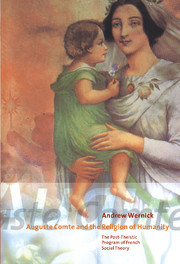Book contents
- Frontmatter
- Dedication
- Contents
- Acknowledgments
- 1 Introduction: rethinking Comte
- 2 The system and its logic (I): from positive philosophy to social science
- 3 The system and its logic (2): from sociology to the subjective synthesis
- 4 Religion and the crisis of industrialism
- 5 Love and the social body
- 6 The path to perfection
- Humanity as ‘le vrai Grand-Être’
- 8 Socio-theology after Comte
- References
- Index
5 - Love and the social body
Published online by Cambridge University Press: 05 July 2014
- Frontmatter
- Dedication
- Contents
- Acknowledgments
- 1 Introduction: rethinking Comte
- 2 The system and its logic (I): from positive philosophy to social science
- 3 The system and its logic (2): from sociology to the subjective synthesis
- 4 Religion and the crisis of industrialism
- 5 Love and the social body
- 6 The path to perfection
- Humanity as ‘le vrai Grand-Être’
- 8 Socio-theology after Comte
- References
- Index
Summary
The notion that the darkest night is just before dawn is a commonplace of western eschatology. In the secularised version of that trope, which surfaced in the dream of a redemptive social transformation during the epoch of bourgeois revolution, the contrast was between a coming reign of reason and freedom and a darkening night of repression, corruption and stupidity, in which old monarchical—clerical regimes were blocking the path of progress. For Hegel, the Jacobin terror was itself the darkest moment. Thereafter, in the disillusioned light of capitalist day, it was the ravages of primitive accumulation and early industrial production in the ‘dark satanic mills’ that provided the nadir of self-caused social misery against which to set the millenarian hope. Whence, via both Saint-Simonian and left—Hegelian translations, the figure made its way into the imaginary of all variants of modern socialism, framing a sense of time that has been, and remains, intrinsic to the very formation of the left as an ideological and political force. Picking a phrase of Rosa Luxemburg's that had been a rallying cry in the Spartacist uprising in 1919, a French neo-Trotskyist circle launched a journal in 1949 with the name Socialisme ou Barbarisme. When Jean-François Lyotard, who had been a member of its editorial collective, associated himself with contemporary ‘suspicion towards all meta-narratives’ in The Postmodern Condition he was distancing himself not only from totalising philosophies of history that saw that process culminating in a realised and liberated humanity, but also from the apocalyptic sense of time to which such thought-grounding teleologies were linked.
- Type
- Chapter
- Information
- Auguste Comte and the Religion of HumanityThe Post-theistic Program of French Social Theory, pp. 116 - 152Publisher: Cambridge University PressPrint publication year: 2001



